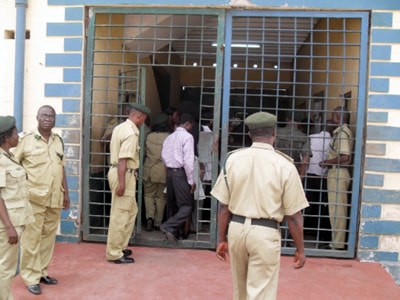Decongestion of Nigeria’s Correctional facilities

To say that the decongestion of Nigerian Correctional facilities is intractable is to state the obvious. Since late 90s when the problem of overcrowding surfaced in the country prisons, efforts by various committees and successive ministers of Interior and Attorney Generals of the Federation toward decongesting the prisons are yet to yield the desire result.

The country would therefore heartily welcome with great gratitude the incumbent Minister of Interior, Ogbeni Rauf Aregbesola if he fulfills his assurance to National Assembly Joint Committee on Appropriation to resolve this intractable problem in 180 days.
Confusion as Armed Robbers kill Policeman in Lagos
“We would do everything humanly possible to ensure that in the next 180 days, we would put the issue of congestion of prisons behind us,” he said.
The country’s 240 Correctional Centres officially built with the capacity to accommodate 50,000 inmates are currently housing 75,000 inmates, majority of who are awaiting trial inmates. That lies the kernel of this problem.
We believe that a hasty implementation of the provisions of Nigerian Correctional Service Act 2019 particularly on its capacity – the section that provides for correctional officers in the facilities to reject any person that is brought from the court, who is awaiting trial, would create more problems than it is intended to solve except the prosecuting agencies have enough safe facilities to keep detainees. It should be noted that once a crime suspect is arraigned in court, the appropriate place to remand them is the prisons.
Perhaps, this explains part of the reasons why over 90 per cent of the awaiting trial inmates are violators of state laws and so are essentially the responsibility of the various state governments.
But, the states are handicapped on prison matter which falls under the exclusive list. Many have canvassed that states should be allowed to have a say in prison matters but such wishes would only be possible with an amendment to the Constitution of the Federal Republic of Nigeria 1999.
Therefore, a holistic approach is required in resolving issues surrounding Correctional Centres’ congestion. The major causes of the congestion are the delays in our justice delivery system and the increases in the crime rate over the years.
A system that permits suspects to be remanded in prisons, instead of summary trials is bound to breed crowded prisons with awaiting trials. This is so, because for some years, the judges’ dockets are daily overloaded with cases and it is only natural that they entertain arraignments and remand the defendants in prisons.
We appeal to stake holders: the Nigeria Police, the judiciary including judges and lawyers, Attorney general of the Federation and States Attorney generals, to work with Minister of Interior to resolve Correctional Centres’ decongestion.







